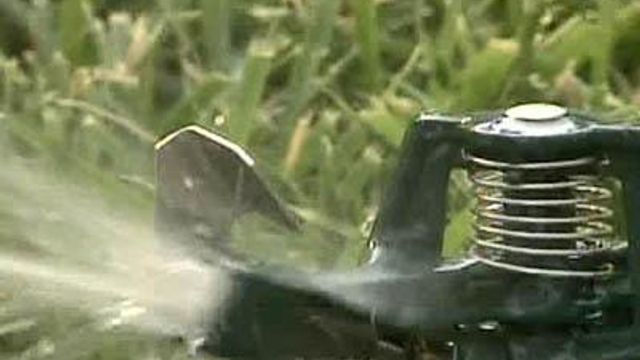Drought Has Raleigh Looking at Sprinkler Ban
Another week with little rain is moving the Triangle deeper into drought. Raleigh leaders are considering the next stage of water restrictions, banning all outdoor watering.
Posted — UpdatedRaleigh implemented Stage 1 water restrictions on Aug. 28, limiting residents to one day of outdoor watering a week with sprinklers and a second day of using a hand-held hose. That move came less than two months after the city first imposed mandatory three-day limits.
Since the Stage 1 limits took effect, daily water consumption has averaged about 50 million gallons on days when outdoor watering is prohibited. Average consumption on Tuesdays and Wednesdays, when watering is permitted, is about 70 million gallons a day.
Dozens of people have been cited for breaking the new watering rules, though city officials said residents shouldn't call 911 operators to report violations.
The city has saved about 100 million gallons at week with the restrictions, but the deepening drought – the region has received only 17 percent of normal rainfall since the end of July – could soon force the city to move to Stage 2 restrictions to conserve as much water as possible.
"We are already at that first point where we start looking at it," said Ed Buchan, a water conservation specialist with Raleigh's Public Utilities Department. "Obviously, that could come right in the middle of grass-growing season, and we don't want that to happen."
Water levels in Falls Lake, the city's primary reservoir, are dropping by a foot every 10 to 12 days. Raleigh and the other municipalities that buy water from the city have enough water to last until about Jan. 20, Buchan said. Any rain would extend the supply.
The city has no water restrictions to impose beyond Stage 2, and officials hope it rains enough this fall that they will not have to craft a Stage 3, Buchan said.
"Something else we'd look at once we start considering Stage 2 is what our options are," he said. He said one option is to draw from Lakes Benson, Johnson and Wheeler, which don't have nearby water treatment plants.
"That's sort of like asking what are we going to do if a meteorite hits the city, you know? You can plan as much as you can, but you have to deal with it when you get there," he said.
State Climatologist Ryan Boyles said hoping for that level of improbability might not be well founded.
"It's not looking good, and we're concerned," Boyles said of the drought. "It's moving beyond, 'Oh well, we are not going to have enough water to keep our lawns green.'"
October and November are traditionally dry months in North Carolina, and the La Niña weather pattern in the Pacific Ocean means the region likely will get even less rain this winter than normal, he said.
"We are very quickly moving for this year to be considered the drought of record," he said, adding that the drought could easily extend into next year.
• Credits
Copyright 2024 by Capitol Broadcasting Company. All rights reserved. This material may not be published, broadcast, rewritten or redistributed.






